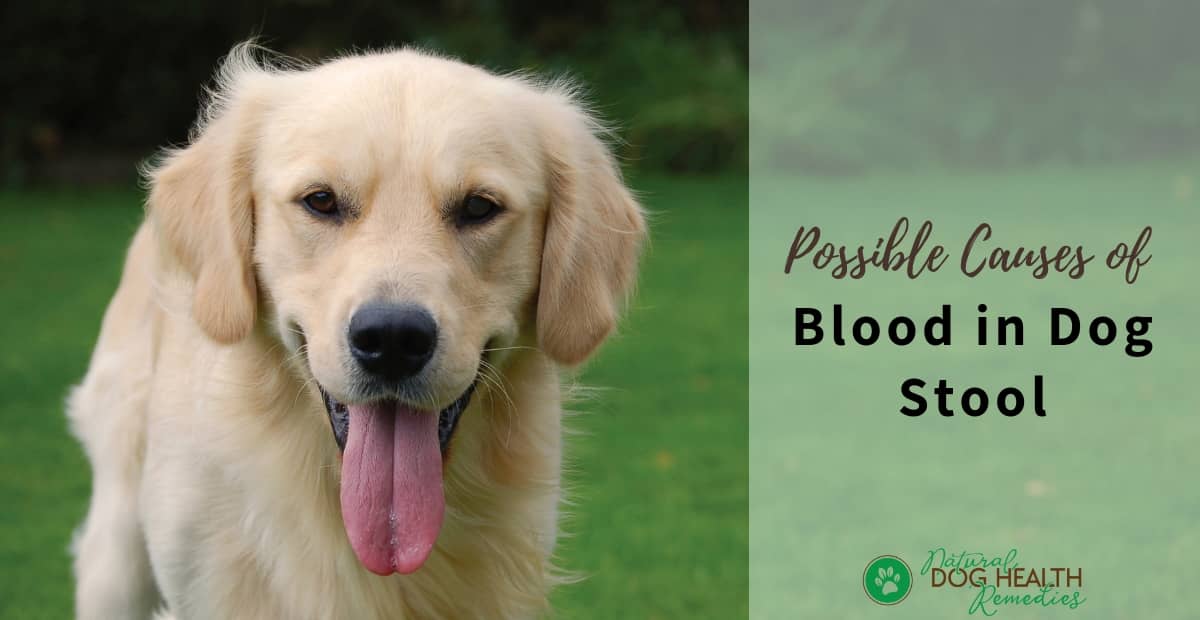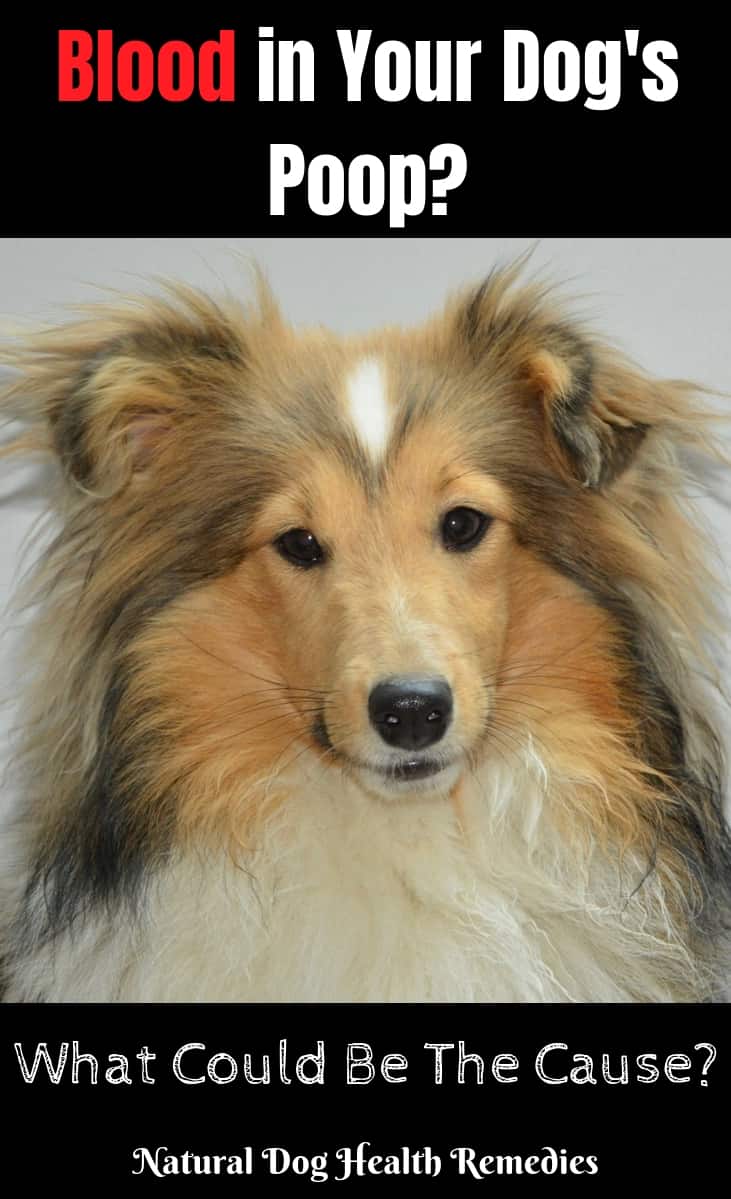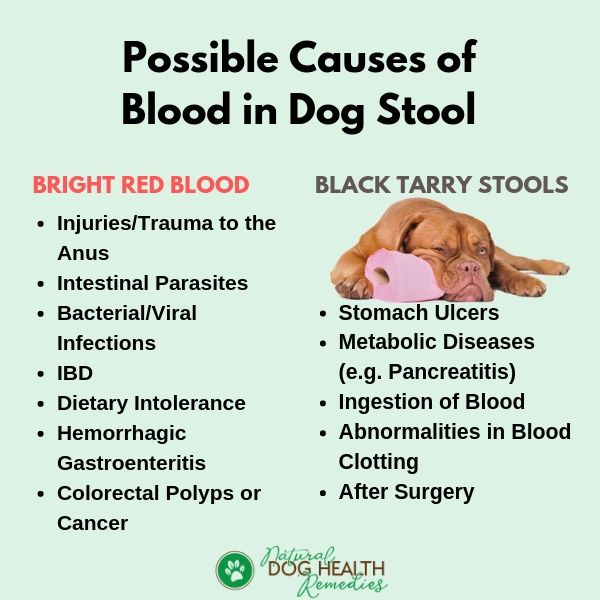Causes of Blood in Dog Stool
(FTC Disclosure: If you make a purchase via a link on this page, I may receive a small commission, at no added cost to you.)

Overview
Dog blood in stool can be medically categorized as either hematochezia or melena.
In the case of hematochezia, the blood in the dog stools is bright red and is usually mixed in with the stools. The red color indicates that the blood comes from the lower intestines, most likely from the colon and the rectum.
In the case of melena, the blood causes the stools to turn black and tarry, indicating that the source of bleeding is in the stomach or upper small intestine, and the blood has been partially digested.
There are numerous possible causes of dog bloody stools - some are more serious than others. Below are some common causes of hematochezia and melena.
Possible Causes of Hematochezia
Possible causes of bright red blood in a dog's stool include:
Injuries or Trauma to the Anus
A common cause of dog having bright red bloody stool is due to some kind of injury or trauma to the anus or the anal area (e.g. getting bitten in the hindquarters during a dog fight). It may also be due to a ruptured anal sac abscess.
Dogs with tails that set low and carried close to the body (e.g. German Shepherds) are prone to a condition called perianal fistulas. These are infected lesions caused possibly by inflammation of the sweat and sebaceous glands in and around the anus.
In all these cases, the blood in the dog's stool does not come from the inside of the dog's body.
When you see bright red blood in your dog stool, therefore, first check the anal area to find out where the blood is coming from.
If it is from an injury in the anal area, try to stop the bleeding and disinfect the area. Get to the vet for further treatment.
Intestinal Parasites
Another common cause of bright red bloody stools in dogs is intestinal worms such as whipworms and roundworms, and intestinal parasites such as Coccidia and giardia.
Bacterial and Viral Infections
Bacterial infections such as Salmonella, E. Coli, and viral infections such as parvovirus and corona virus can also cause puppies and dogs passing bright red bloody stool.
Inflammatory Bowel Diseases
Inflammatory bowel diseases (e.g. colitis) can cause dogs to pass bloody stools. Look for other accompanying symptoms such as abdominal distention, diarrhea, and vomiting.
Dietary Intolerance or Indiscretion
Eating too much, eating spoilt foods or food intolerance and food allergies can sometimes cause bloody stools in puppies and dogs. Usually the dog will also vomit, have stomach cramps, and diarrhea.
Hemorrhagic Gastroenteritis (HGE)
HGE is a disease in dogs whose cause is unknown. It usually causes a very sudden onset of diarrhea with fresh blood in it. Look for other symptoms such as vomiting, not eating, and listlessness. Sometimes black, tarry stools (melena) can also be seen.
Colorectal Polyps or Cancer
Hematochezia may indicate more serious conditions such as polyps in the colon or rectum, or colon cancer.
Possible Causes of Melena
If your dog is passing black tarry stools, these may be the causes:
Stomach Ulcers
 Dogs with stomach ulcers usually pass black, tarry stools.
Dogs with stomach ulcers usually pass black, tarry stools.
Ulcers in dogs may be caused by medications such as NSAIDs, corticosteroid, aspirin, etc. Ulcers may also occur following acute stomach bloating, heat stroke, stress, and a type of mast cell cancer in the skin.
Metabolic Diseases
Certain metabolic diseases, such as kidney and liver failure, pancreatitis and Addison's disease can cause bleeding into the intestinal tract, resulting in black tarry stools.
Ingestion of Blood
Black tarry stools may also result from the dog ingesting some blood.
No, I am not suggesting that your dog has turned into Dracula! Rather, your dog might have licked a bloody wound or he might have had a mouth injury causing him to swallow blood. The partially digested blood turns the stools to black and tarry.
After Surgery
Melena can occur 12 to 72 hours after surgery performed on the upper gastrointestinal tract.
Abnormalities in Blood Clotting
Blood clotting disorders result in internal bleeding, causing blood in dog stool. Check for evidence of bleeding from other body sites. For example, purple tinted skin suggests that there is bleeding under the skin.

When to See a Vet
As you can see, there are many possible causes of dog pooping blood. The most important thing to do if your dog passes bloody stools is, be sure to collect a fecal sample and take it to your vet for analysis. Note that the sample needs to be no longer than 12 hours old to ensure testing accuracy.

See a Vet Immediately if...
... your dog shows the following symptoms besides having bloody stools:
- Pale gums
- Weakness and lethargy
- Restlessness
- Vomiting
- Diarrhea
- Dehydration
Home Remedies for Dogs Having Bloody Diarrhea
As mentioned above, dogs having bloody diarrhea could be caused by a serious health issue, so veterinary attention is needed.
But that doesn't mean you can't do anything at home to help your dog recover quicker. For example, you can:
Fast the Dog
If your dog is having diarrhea, the best thing to do is to let the dog fast for 24 to 48 hours. This allows the digestive system to "rest", and allows the body to focus on fighting off the disease that causes the diarrhea.
Keep the Dog Hydrated
Be sure to keep your dog or puppy hydrated by offering him lots of water to drink.
If your dog doesn't want to drink water, make a vegetable and chicken broth and feed only the liquid part to the dog several times a day.
Use a needle-less syringe if necessary.
Feed the Dog a Bland Diet
When diarrhea stops, you can feed your dog a bland diet of ground turkey with plain canned pumpkin (or sweet potato puree) (50:50 ratio) in small amounts 3 to 6 times per day.
Give the Dog Probiotics and Enzymes
To help re-balance the gut flora and boost the immune system, give the dog probiotics. Also, use enzymes to help the weakened body digest foods and absorb nutrients.
Consider keeping this natural remedy in your dog's first aid kit:
This Tummy Support contains enzymes, probiotics and B vitamins and works quickly to normalize digestion, balance microflora levels and help detoxify the GI tract. Good for dogs with upset tummy and loose stool.
ReferencesEldredge, et al. Dog Owner's Home Veterinary Handbook 4th edition (Wiley Publishing, 2007).
C.J. Puotinen, Natural Remedies for Dogs and Cats (Keats Publishing, 1999).
M. Goldstein, The Nature of Animal Healing (Ballantine Books, 2000).
R.H. Pitcairn, The Complete Guide to Natural Health for Dogs and Cats (Rodale, 2005).





